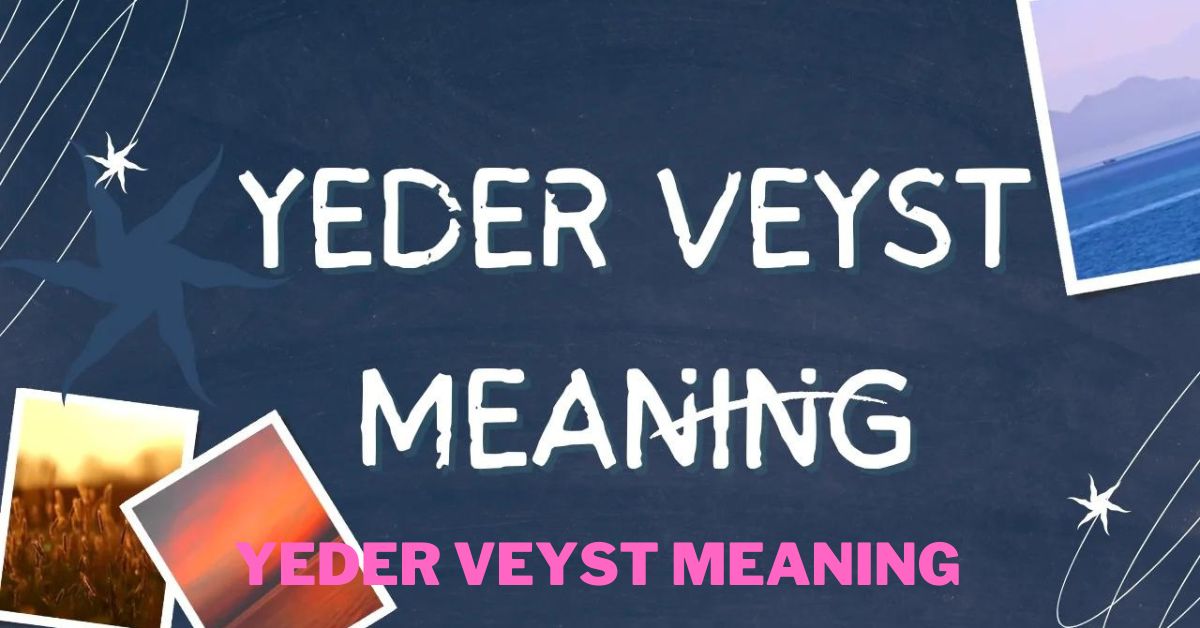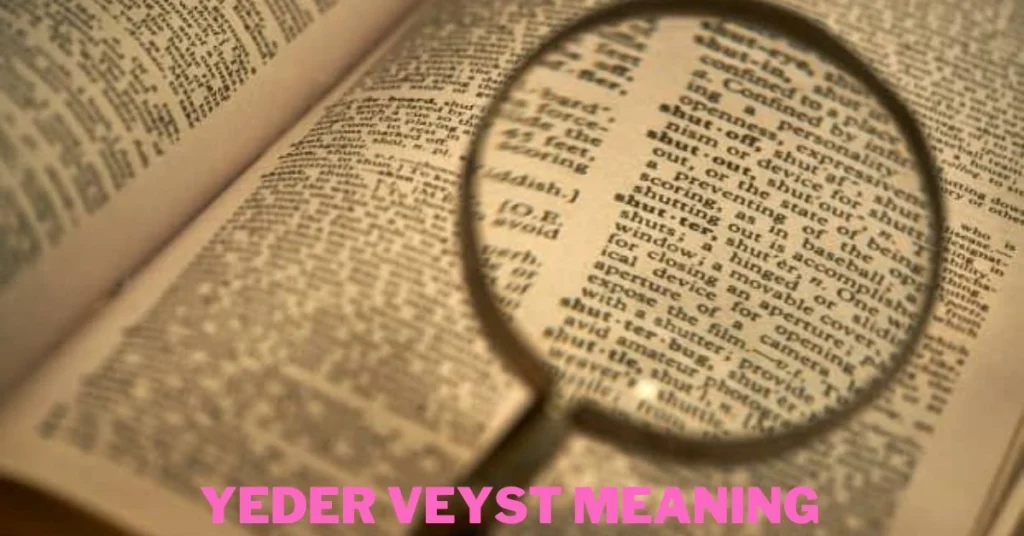Introduction
Language is full of rich phrases and expressions that carry deep cultural and historical significance. Some of these phrases transcend their original context and become part of everyday speech, while others remain tied to specific communities or ideas. One such phrase is “yeder veyst,” which holds its own particular meaning and weight. In this article, we will delve into the yeder veyst meaning, exploring its linguistic roots, cultural relevance, and various interpretations across different contexts. By the end of this article, you will not only understand what yeder veyst means but also appreciate its broader significance in both modern and traditional language use.
The Linguistic Origins of “Yeder Veyst”
The phrase “yeder veyst” stems from the Yiddish language, a fusion of German, Hebrew, Aramaic, and Slavic languages spoken by Ashkenazi Jews. Yiddish itself is known for its colorful expressions that capture the essence of everyday life and the cultural experiences of its speakers.
To break it down, “yeder” translates to “everyone” or “everybody,” and “veyst” translates to “knows.” Therefore, the yeder veyst meaning is quite literally “everyone knows.” While the translation may seem straightforward, the significance of this phrase goes beyond its literal meaning.
Cultural Significance of “Yeder Veyst”
In many cultures, particularly in Yiddish-speaking communities, phrases like “yeder veyst” are often used not just for their literal meaning but to convey deeper emotions or nuances in conversation. The yeder veyst meaning could range from a casual acknowledgment that something is common knowledge to a sarcastic remark about something everyone “should” know but may not.
For example, in a close-knit community where shared experiences are common, someone might say, “Yeder veyst that the bakery closes early on Fridays,” implying that this is something so well-known that it doesn’t even need to be stated. Conversely, the same phrase could be used sarcastically, such as, “Yeder veyst the mayor is always late,” implying that everyone accepts this fact, whether they like it or not.
The Broader Implications of “Yeder Veyst”
The yeder veyst meaning isn’t confined to just knowledge. It often carries with it an implicit understanding of social norms, cultural expectations, and even moral judgments. When someone says, “yeder veyst,” they are not just saying that something is known; they are suggesting that it is widely accepted, perhaps even unquestionable.
This makes the phrase particularly powerful in situations where tradition or long-held beliefs come into play. For instance, in a religious context, the phrase might be used to imply that certain practices or beliefs are so ingrained in the community that to question them would be to go against the grain. The yeder veyst meaning in such a context could also imply that certain unspoken rules exist, and everyone is expected to follow them without explicit instruction.
Yeder Veyst in Modern Usage
Though the phrase originates from Yiddish, the yeder veyst meaning has found its way into modern vernacular, particularly in regions with strong Jewish cultural influences. In some cases, it’s used more casually, almost akin to saying, “of course” or “obviously.” However, even in modern usage, the phrase retains its cultural depth.
In the digital age, where information is more accessible than ever, the phrase “yeder veyst” could be used ironically, especially when something is not as universally known as the speaker might suggest. For example, someone might say, “Yeder veyst how to fix a computer,” implying that tech-savvy individuals are expected to know such things, even if the majority of people do not.
Exploring the Different Contexts of “Yeder Veyst”
In social interactions, the yeder veyst meaning can be used to either bring people together through shared knowledge or to emphasize someone’s outsider status. In tight-knit communities where everyone is expected to be “in the know,” using this phrase may subtly point out that a newcomer or outsider does not yet belong to the group.
For example, if someone new to a community asks about a local custom, they might be met with a response like, “Oh, yeder veyst that!” This not only highlights the newcomer’s lack of familiarity but also reinforces the sense of insider knowledge among the established members of the group.
Religious and Cultural Context
The yeder veyst meaning takes on additional weight in religious or cultural contexts. In communities where tradition and rituals play an important role, using the phrase can be a way to signal shared beliefs or practices without explicitly discussing them.
Consider, for example, the observance of holidays or religious customs. Someone might say, “Yeder veyst that we fast on Yom Kippur,” as a shorthand way of expressing not just the knowledge of the practice but also its importance and near-universal observance within the community. In this sense, yeder veyst doesn’t just mean “everyone knows”; it also means “everyone does.”
Political Context
In the political arena, the yeder veyst meaning can be employed to either criticize or affirm certain positions. A politician might use the phrase to emphasize how obvious a particular truth is, thereby shaming opponents who disagree or suggesting that any argument to the contrary is either ignorant or insincere.
For instance, in a heated political debate, someone might say, “Yeder veyst that climate change is real,” implying that this is a widely accepted fact, and any opposition to it is either ill-informed or intentionally misleading.
Educational Context
In educational settings, the yeder veyst meaning can function as a rhetorical tool. Teachers or lecturers might use the phrase to emphasize points that are considered foundational or common knowledge within a specific field of study. For example, in a history class, a teacher might say, “Yeder veyst that the Treaty of Versailles ended World War I,” reinforcing the idea that this is a basic fact everyone should know.
However, it could also be used more playfully to encourage students to think critically. For example, a teacher might say, “Yeder veyst that Columbus discovered America,” only to follow it up with a more nuanced discussion about the indigenous populations that were already there, thus challenging the initial assumption.
The Evolution of “Yeder Veyst” in Popular Culture
In recent years, the yeder veyst meaning has appeared in various forms of popular culture, especially in media that seeks to highlight Jewish experiences or Yiddish-speaking characters. Television shows, movies, and even online forums sometimes use the phrase either as a nod to Yiddish culture or as a way to inject humor into a situation.
For example, in a comedy sketch about an overbearing Jewish mother, the character might say something like, “Yeder veyst that you should never visit without bringing food!” This use of the phrase taps into cultural stereotypes while also reinforcing the idea of common knowledge within a particular group.
The Subtlety of Sarcasm in “Yeder Veyst”
One of the more interesting aspects of the yeder veyst meaning is its potential for sarcasm. In conversations where the speaker feels frustrated or exasperated, “yeder veyst” can be delivered in a way that implies the opposite of what is being said. For example, a disgruntled employee might say, “Yeder veyst this is the best job in the world,” while clearly meaning the opposite.
This sarcastic usage allows for a level of subtlety that other expressions might not offer. The phrase becomes a vehicle for venting frustration, while still maintaining a veneer of civility. It’s this flexibility that makes “yeder veyst” such an enduring part of everyday language.
Conclusion
The yeder veyst meaning may seem simple at first glance—”everyone knows”—but as we’ve explored throughout this article, the phrase carries a wealth of cultural, social, and emotional weight. Whether used in its traditional Yiddish context or adapted into modern vernacular, “yeder veyst” is a phrase that encapsulates shared knowledge, community norms, and sometimes even a hint of sarcasm.
As language continues to evolve, phrases like “yeder veyst” remind us of the power of words to not only communicate but also connect people across time and culture. By understanding the yeder veyst meaning in its various contexts, we gain a deeper appreciation for the richness of Yiddish expressions and the ways they continue to influence language today.
Read More: Play Heardle 60’s: Challenge Yourself with the Greatest Songs of the 1960s






